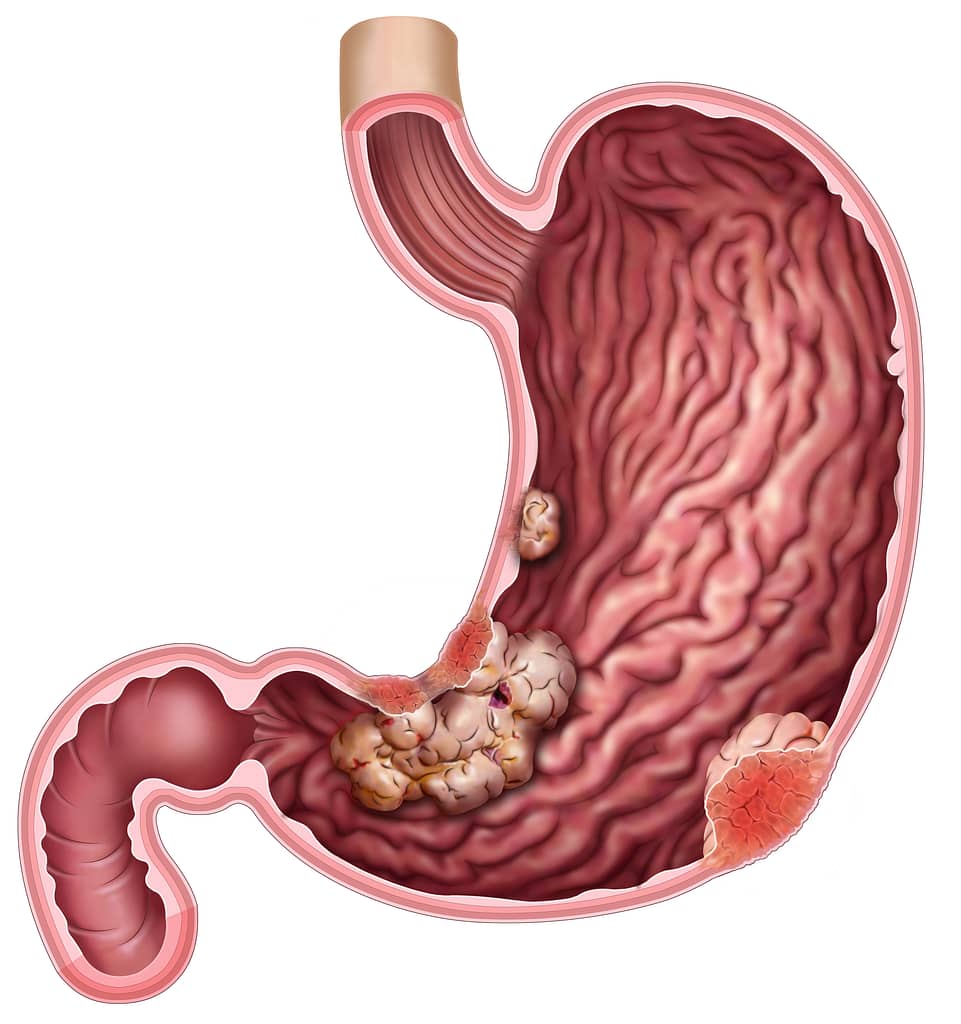Gastric Cancer
Key Topics
Introduction
Gastric cancer, also known as stomach cancer, is a type of cancer that develops in the cells of the stomach. It is the fifth most common cancer worldwide, with over one million new cases diagnosed each year. In England, it is the 17th most common cancer, accounting for around 2% of all cancer cases.

Epidemiology
According to the Office for National Statistics, in 2019, there were 7,870 new cases of gastric cancer diagnosed in England, and the incidence rate was 11.5 per 100,000 population. The incidence is higher in men than in women, with a male-to-female ratio of 2:1. The incidence rate also increases with age, with the highest incidence rate observed in people aged 80 and over.
The mortality rate for gastric cancer in England has been steadily declining over the last few decades. In 2018, there were 4,865 deaths from gastric cancer, and the age-standardized mortality rate was 6.6 per 100,000 population.
Risk Factors
Several risk factors have been identified for gastric cancer, including:
- Helicobacter pylori infection: H. pylori is a type of bacteria that can infect the lining of the stomach and cause chronic inflammation. This inflammation can increase the risk of developing gastric cancer. This bacterium is a major risk factor for gastric cancer, and it is estimated that over 70% of all gastric cancer cases are associated with H. pylori infection
- Diet: Consumption of a diet high in salt, salted foods, and smoked or pickled foods has been linked to an increased risk of gastric cancer.
- Smoking: Smoking is a known risk factor for several types of cancer, including gastric cancer.
- Alcohol consumption: Heavy alcohol consumption has been associated with an increased risk of gastric cancer. This may be due to the direct toxic effects of alcohol on the stomach lining, as well as its ability to increase the production of gastric acid.
- Age: The risk of developing gastric cancer increases with age, particularly after the age of 50.
- Gender: Men are more likely to develop gastric cancer than women.
- Family history: People with a family history of gastric cancer are at a higher risk of developing the disease.
- Pernicious anemia: This is a type of anemia that occurs when the body is unable to absorb vitamin B12, and it is associated with an increased risk of gastric cancer.
- Previous stomach surgery: People who have had surgery to remove part of their stomach or have had a gastric bypass surgery are at an increased risk of developing gastric cancer.
- Genetic conditions: Several genetic conditions are associated with an increased risk of developing gastric cancer. These include hereditary diffuse gastric cancer syndrome (HDGC), Lynch syndrome, familial adenomatous polyposis (FAP), and Li-Fraumeni syndrome. Genetic testing and counselling can help identify individuals with these rare conditions and guide their medical management and surveillance.
It’s important to note that having one or more of these risk factors does not necessarily mean that a person will develop gastric cancer, and many people who develop the disease have no known risk factors. However, knowing about these risk factors can help individuals take steps to reduce their risk of developing gastric cancer.
Signs and Symptoms
The signs and symptoms of gastric cancer can vary depending on the stage of the disease. In the early stages, there may be no symptoms at all. As the cancer progresses, the following symptoms may occur:
- Abdominal pain or discomfort
- Nausea and vomiting
- Loss of appetite and weight loss
- Fatigue
- Blood in the stool
- Difficulty swallowing
- Indigestion
- Anaemia
Diagnosis
If a person has symptoms that suggest gastric cancer, their doctor may order one or more tests to diagnose the disease. These may include:
- Upper gastro-intestinal endoscopy (Gastroscopy): This procedure involves inserting a thin, flexible tube with a camera on the end (an endoscope) into the mouth and down the throat to examine the oesophagus, stomach and upper part of the small intestine.
- Biopsy: During an endoscopy, the doctor may take a small sample of tissue (a biopsy) from the stomach to be examined under a microscope for signs of cancer.
- Imaging tests: Tests such as CT scans, MRIs, and PET scans may be used to look for signs of cancer in the stomach and other parts of the body.
Treatment
The treatment of gastric cancer depends on the stage of the cancer and the overall health of the patient. The main treatments for oesophageal cancer include surgery, chemotherapy, and radiation therapy.
- Surgery: Surgery is the main treatment for early-stage oesophageal cancer and involves the removal of the tumor and surrounding lymph nodes. There are two main types of surgery for gastric cancer: endoscopic resection (for early-stage tumors) and gastrectomy (for larger tumors).
- Chemotherapy: Chemotherapy is often used in combination with surgery to shrink the tumor before surgery (neoadjuvant chemotherapy) or after surgery to kill any remaining cancer cells (adjuvant chemotherapy).
- Radiation therapy: Radiation therapy involves the use of high-energy radiation to kill cancer cells. It is often used in combination with chemotherapy before
- Targeted therapy: Targeted therapy involves using drugs that specifically target cancer cells. These therapies work by targeting specific molecules that are present on cancer cells or that support their growth and spread.
- Immunotherapy: Immunotherapy for cancer is a type of treatment that harnesses the body’s immune system to fight cancer. It works by using drugs or other substances to stimulate the immune system to recognise and attack cancer cells.